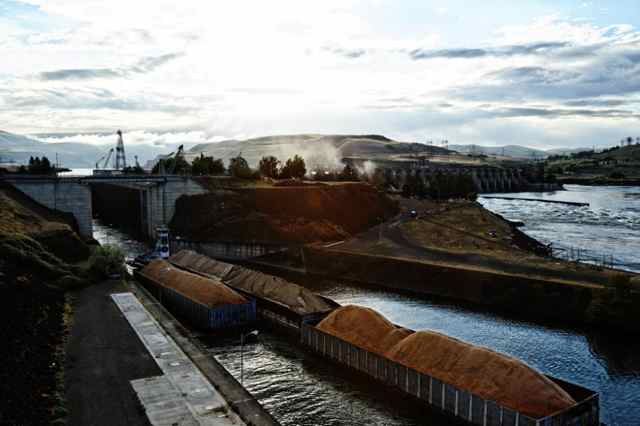forum
library
tutorial
contact

Port of Portland Subsidizes Lewiston-to-Portland
Container Service After Shipping Lines Pull Out
by Molly Harbarger
The Oregonian, December 4, 2015
|
the film forum library tutorial contact |

|
Port of Portland Subsidizes Lewiston-to-Portland
by Molly Harbarger
|
 After the second major shipping line stopped serving the Port of Portland in April, farmers and paper companies upriver in Lewiston, Idaho, lost their best connection to global trade.
After the second major shipping line stopped serving the Port of Portland in April, farmers and paper companies upriver in Lewiston, Idaho, lost their best connection to global trade.
Now, that service is coming back -- kind of. A container barge set off Thursday from Lewiston for the first time in eight months, carrying containers of agricultural and paper products to the Port of Morrow in Boardman, where it will be put on a rail shuttle that takes the containers to Portland.
From there, the boxes will either be loaded onto a Westwood ship that calls once a month at the Port of Portland, or taken to Seattle or Tacoma to ship from there.
The first runs of the barge and rail system are being subsidized by the Port of Portland. Officials say they expect it to pay for itself quickly.
"We appreciate this kind of 'out of the box' thinking from all parties involved, providing a partial solution to shipping challenges while we continue working to recruit critical new transpacific service," said Port of Portland Executive Director Bill Wyatt. "We hope the success of this plan will entice labor and terminal management to come together in agreement sooner and shippers to resume frequent, regular container service."
Nearly all of the port's container shipping business was cancelled earlier this year amid labor strife at Terminal 6, the Port of Portland's container terminal. It hurt exporters in Oregon, as well as southern Washington and western Idaho.
This time of year, two barges a week would have traditionally been setting out from Lewiston carrying hundreds containers of "pulse" crops -- chickpeas, lima beans, lentils, peanuts, dry peas, soybeans and other legumes. That all stopped when Hapag-Lloyd, which shipped 90 percent of those exports to European countries, stopped sending empty containers for farmers to fill up and barge back to Portland.
Without that connection to Idaho's foreign customers, Lewiston port officials shut down their container port in the spring, forcing farmers and the Clearwater Paper Corp. to truck their boxes to California and Seattle.
It was a logistical nightmare, with too few trucks available and costs nearly double what barging on the Columbia Snake River channel had cost. David Doeringsfeld, director of the Port of Lewiston, said companies used railroads when they could, but the service was limited.
The new barge-to-rail service has two scheduled trips before the end of the year, in addition to Thursday's. It will likely run every two weeks from then on. Space on the barges is filling up quickly.
Doeringsfeld's phone started ringing with companies trying to get their boxes on the barges within minutes of announcing the service at the end of November.
Maviga, a pulse-exporting company, was the first to book room on the first barge. Maviga executive Mike Quann said the service should be cheaper for farmers and relieve congestion on Interstates 5 and 90.
"It's a win-win situation for everyone," Quann said.
But it won't accommodate everyone.
"This is not making up for the loss of container-by-barge to Portland by any degree, but hopefully it provides another option for exporters in a very constrained market," Doeringsfeld said.
The Port of Portland is paying $51,000 to get the system up and running. Officials expect it to pay for itself by January.
The first 20-container load is not at full capacity -- the boxes aren't completely filled, because the equipment required to haul heavy boxes isn't available in large supply. But once enough farmers start to use the system, more heavy-duty equipment will be directed to the barge-and-rail service from other port systems allowing fully-filled containers.
Port of Portland spokesman Kenny Macdonald said that is the point when enough money will be moving through the service for farmers, shipping logistics companies and others in the transportation ecosystem to support the barge-and-rail service without the Port of Portland's $95-to-100 per box subsidy.
Northwest Container Service operates both the rail yards in Boardman and Portland, and already increased runs between Portland and the Puget Sound ports in the past year to help container exporters stranded by the loss of Hanjin Shipping Co. and Hapag-Lloyd.
The rail company is working with the ports in Portland and Lewiston, as well as Tidewater Barge Lines, to complete the system.
The idea grew from sessions with farmers and exporting companies around Oregon, conducted by the state's business and development agency, asking for solutions to shipping problems since Portland's terminal services left.
Officials from the Port of Portland and ICTSI Oregon, which operates its container terminal, are still courting shipping lines to provide more direct connections to Asia and Europe, where the bulk of Oregon's exports go.
Port Executive Director Bill Wyatt said four carriers are being targeted to serve many of Oregon's biggest trade partners -- Japan, China and Korea -- but that if the local chapter of the International Longshore and Warehouse Union won't work with ICTSI Oregon, it will continue to be difficult to entice any shipping lines to serve Portland.
Related Pages:
Port of Portland's Marine Terminal Shipments Plummet Year Over Year by James Cronin, Portland Business Journal, 11/20/15
learn more on topics covered in the film
see the video
read the script
learn the songs
discussion forum
